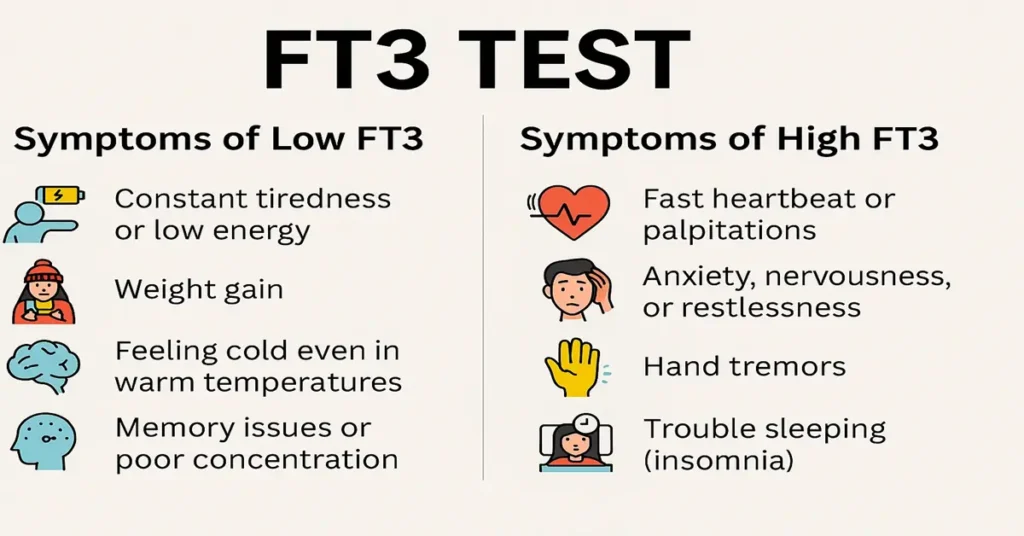Overview
The FT3 (Free Triiodothyronine) Test measures the amount of free T3 hormone in your blood.
T3 (Triiodothyronine) is one of the main thyroid hormones produced by the thyroid gland, which regulates your body’s metabolism, energy, and many vital functions.
Most of the T3 in your blood is bound to proteins, but the FT3 test measures the unbound or “free” portion — the active hormone that enters your body’s cells to perform essential metabolic functions.
Doctors recommend this test to evaluate thyroid function, especially to diagnose hyperthyroidism (overactive thyroid) and to monitor thyroid treatment.
Where is FT3 Produced in the Body?
FT3 (Free Triiodothyronine) is produced both inside and outside the thyroid gland:
- About 20% of total T3 (including free T3) is directly produced by the thyroid gland.
- The remaining 80% is converted from T4 (Thyroxine) in the liver and kidneys through an enzymatic process.
- Only a small fraction of total T3 circulates as free (unbound) T3, which is measured in the FT3 test.
This free portion is what actually regulates metabolism and controls energy usage at the cellular level.
Main Functions and Importance of FT3
FT3 is the biologically active form of thyroid hormone — it’s the hormone that directly acts on your cells and tissues.
Key Functions:
- Regulates Metabolism
Controls how the body converts food into energy and maintains calorie burning. - Maintains Body Temperature
Helps the body adapt to temperature changes and supports heat production. - Supports Heart, Muscle, and Nerve Function
Regulates heart rate, muscle strength, and nerve impulses. - Enhances Brain Function and Mood
Improves concentration, memory, and emotional balance. - Aids in Digestion and Reproductive Health
Helps maintain digestive activity and hormonal stability. - Improves Cellular Oxygen Use
Encourages cells to efficiently use oxygen for energy production.
In short, FT3 acts like the “engine activator” that keeps all body systems running efficiently.
Causes of Low FT3 Levels
Low FT3 levels suggest that your body is not producing or converting enough thyroid hormone.
This can occur due to thyroid problems or other chronic health issues.
Common Causes:
- Hypothyroidism (underactive thyroid gland)
- Pituitary gland disorders (low TSH reduces T3 production)
- Chronic illnesses (like liver or kidney disease)
- Sick euthyroid syndrome (low T3 due to severe illness, not thyroid-related)
- Prolonged fasting or malnutrition
- Medications (steroids, beta-blockers, amiodarone)
Symptoms of Low FT3 Levels
Low FT3 slows down metabolism and affects multiple body systems.
- Persistent tiredness or fatigue
- Weight gain despite normal diet
- Feeling cold often, even in warm conditions
- Depression or mood swings
- Slow heartbeat
- Dry skin and brittle hair
- Constipation
- Poor memory or difficulty concentrating
- Irregular periods or reduced fertility in women
If untreated, low FT3 may lead to severe hypothyroidism, causing long-term fatigue and health issues.
Causes of High FT3 Levels
High FT3 levels indicate that your thyroid gland is producing too much hormone — leading to hyperthyroidism.
Common Causes:
- Hyperthyroidism (Overactive Thyroid)
- Graves’ Disease (autoimmune condition)
- Thyroid nodules or toxic goiter
- Thyroiditis (inflammation of the thyroid gland)
- Excess thyroid medication
- T3-producing thyroid tumors (rare)
Symptoms of High FT3 Levels
Excess FT3 speeds up metabolism and overstimulates body functions.
- Rapid heartbeat or palpitations
- Weight loss despite increased appetite
- Anxiety, restlessness, or nervousness
- Excessive sweating or heat intolerance
- Tremors in hands or fingers
- Trouble sleeping (insomnia)
- Frequent bowel movements or loose stools
- Muscle weakness or fatigue
- Irregular menstrual cycles
If not managed, very high FT3 can cause thyroid storm, a serious medical emergency.
Reference Ranges
Note: Ranges may slightly vary by laboratory.
| Parameter | Normal Range |
|---|---|
| Free T3 (FT3) | 2.3 – 4.2 pg/mL |
- Below 2.3 pg/mL → May indicate Hypothyroidism
- Above 4.2 pg/mL → May indicate Hyperthyroidism
Sample Type and Test Details
- Sample Type: Serum (blood)
- Tube Used: Red Top (Plain)
- Fasting Required: No (unless combined with other thyroid tests)
- Associated Tests: TSH, Free T4, Total T3
Blood is drawn from a vein in your arm, and results are usually available within 24 hours.
Test Preparation
- Avoid thyroid medications on the day of testing unless instructed.
- Avoid biotin supplements for at least 2–3 days before the test (biotin interferes with thyroid assays).
- Inform your doctor if you are pregnant or taking hormone therapy, steroids, or beta-blockers.
- No special fasting is required.
When to Consult a Doctor
You should consult a doctor if you notice:
- Unexplained weight loss or gain
- Fatigue, weakness, or low energy
- Anxiety, irritability, or mood changes
- Irregular heartbeat
- Hair loss, dry skin, or menstrual changes
Abnormal FT3 results should be interpreted along with TSH and Free T4 tests for accurate diagnosis.
Important Word Explanations
| Term | Meaning |
|---|---|
| FT3 (Free Triiodothyronine) | Active thyroid hormone available for cell use. |
| T4 (Thyroxine) | Precursor hormone converted into T3 in tissues. |
| TSH (Thyroid Stimulating Hormone) | Pituitary hormone that regulates thyroid activity. |
| Hypothyroidism | Underactive thyroid gland, low hormone levels. |
| Hyperthyroidism | Overactive thyroid gland, high hormone levels. |
| Graves’ Disease | Autoimmune disorder that overstimulates the thyroid. |
| Sick Euthyroid Syndrome | Temporary thyroid hormone imbalance during illness. |
~END~

